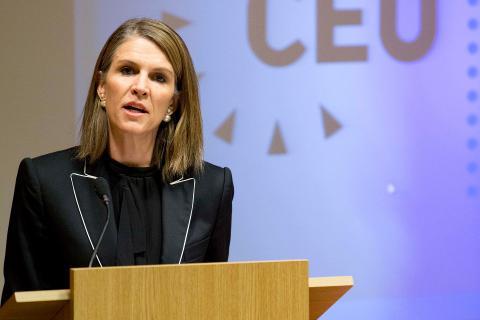"Visegrad Group Divided on Russian Relations, but Maintaining Cooperation" - Event Report

“The Visegrad countries know better than most that security, whether military, economic, human or otherwise, can never be taken for granted,” said U.S. Ambassador Colleen Bell in her opening remarks at the roundtable discussion “Security Cooperation in the Visegrad Group – Regional Challenges and Initiatives,” co-hosted by the U.S. Embassy and CEU’s Center for EU Enlargement Studies (CENS) on April 23. The Visegrad group, known as V4, is made up of Hungary, the Czech Republic, Slovakia and Poland.
Many seem to think that the V4 did not display unity in the response to Russia’s aggression in Ukraine. Hungary is seen as having taken a 'special path', with regard to a somewhat ill-timed allusion by Prime Minister Viktor Orban to the need for more autonomy for Hungarian minorities in Ukraine, a temporary suspension of reverse-flow gas supplies to Ukraine in September of 2014, and President Vladimir Putin’s visit to Budapest, according to Peter Marton, associate professor at Corvinus University. He added, however, that the gas supplies in question were restarted in January, and Hungary also offered a contingent for the proposed joint NATO taskforce to be set up with a view to developments on NATO's eastern periphery. He also noted that "while Poland and Russia tend to have their exchanges", in fact "Polish diplomacy is much more considerate than many imagine it to be". Marton explained this with reference to trade between Poland and Russia, including 60 percent of Poland’s gas which also comes from Russia. “The situation looks a bit like two men brawling on the street. It could come to blows any second now, but the parties abruptly stop shouting to sell some items to each other. Very paradoxical,” said Marton. He also argued that the V4’s division can very simply be explained by geography, as the “dissenting” countries, Hungary, the Czech Republic and Slovakia are less accessible for Russia.
Fruzsina Tofalvi of the Hungarian Ministry of Defense talked about the lessons learned from V4 military cooperation to establish the Visegrad Battlegroup. She said that regional defense cooperation gained significant support after the crisis in 2008, when defense budgets started to decline. According to McKinsey & Company’s findings, even with a fixed yearly defense budget, capability development will get less money proportionately in the long run. “Regional cooperation is a good solution to pool resources for development, while costs may also be cheaper. The concept is also underpinned by converging threat conceptions and the already existing ties,” Tofalvi said. The minimum 1,500-strong peacekeeping battle group, which can be deployed anywhere in the world for 30 to 120 days, will be set up by the first half of 2016. Tofalvi said that one of the advantages of such a force is that it requires extensive consultation between countries, which has helped in further strengthening the V4 cooperation.
Zsuzsanna Vegh, assistant researcher at CENS, talked about how V4’s image as an authority on successful transition was eroded in recent years. She said that before 2014, V4 was very successful in turning the intraregional cooperation of V4 to an interregional one, engaging countries east of the EU and in the west Balkans as an expert on transition. “When it became visible that V4 countries are not united in their commitment to democratic institutions, and that while they are backing the sanctions on Russia, there is a considerable divergence in their rhetoric, the narrative got undermined,” Vegh said. She added that despite an apparent decline in enthusiasm, projects promoting V4’s transition expertise are ongoing and well attended. She also reminded that Ukrainian President Petro Poroshenko is very intent on cooperation with the V4 in assisting Ukraine’s transition and possible admission to the EU, even mentioning a new V5 with Ukraine as a possibility.
The report was originally published on CEU's main website.
Further photos from the event:
